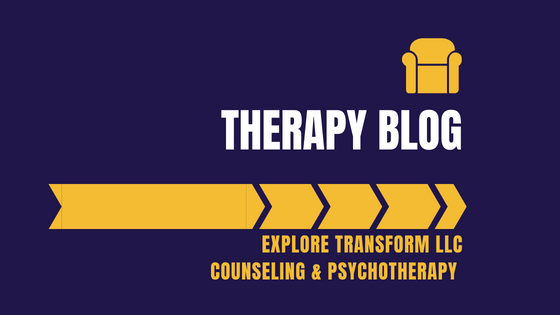|
If you need to talk to someone about anxiety, depression or trauma, and you are gender queer, transgender, or non-binary, you need to make sure that you are opening up in a safe environment. There are some professionals who might claim to be accepting, but the reality is far from true. I have been on the receiving end of professionals who let their personal biases leak out, making crass assumptions and pathologizing people because of their own lack of experience.
Some people who are reading this might have questions about gender identity, either because they are exploring their own identity, or they know someone who is. As a result, let’s answer: What is gender identity? Gender identity? In the words of Gender Spectrum, gender identity is 'our internal experience and naming of our gender. It can correspond to or differ from the sex we were assigned at birth'. Gender identity is not a binary concept, this is simply how we have understood (or oversimplified) gender. The reality is that gender identity exists on a spectrum, and this can include people who are transgender, cis gender, non-binary, gender queer, and other gender identities. 'Because we are provided with limited language for gender, it may take a person quite some time to discover, or create, the language that best communicates their internal experience. Likewise, as language evolves, a person’s name for their gender may also evolve. This does not mean their gender has changed, but rather that the words for it are shifting.' 'Each dimension of gender is informed by our unique intersection of identities, experiences, and personal characteristics. We are more than our body, gender identity and gender expression: we are also our race, ethnicity, class, faith, sense of geographic place, family history, and more. Our gender is personal because, while we share some of these aspects of self with others, the way that all of these identities, influences and characteristics come together is unique to each of us'. Read more here https://www.genderspectrum.org/quick-…/understanding-gender/ What is cisgender privilege? If someone’s gender identity corresponds to the sex they were assigned at birth, this is known as cisgender. To identify as cisgender means that you live with cisgender privilege, whether you are aware of this or not. Cisgender privilege means that you do not have to endure the overt and covert discrimination experienced by many people who are not cisgender (for example, people who are transgender, non-binary, or gender queer). Cisgender privilege means you can assume you will not be denied work, a home, healthcare, a place to worship, a family to love, or your personal safety, because of your gender identity. Cisgender privilege means that you don’t have to remind people (even your loved ones) of your pronouns, and/or your name (for example, you are not dead-named). Seemingly innocuous moments in everyday life can symbolize cisgender privilege, which basically assumes a binary construct of gender identity. Examples of these everyday moments are set out below:
To pretend that there are only cisgender people in society is to pretend that parts of our population do not exist. To do this is offensive, and it can leave a lasting impact on someone’s mental health. “40% of transgender adults reported having made a suicide attempt, and 92% of these having attempted suicide before the age of 25” (Trevor Project). In addition, 86% of transgender individuals reported sexual or physical assault. Here are some accounts from a Human Rights Watch report: “Alexander S., a 16-year-old transgender boy in Texas, said: I started getting a lot of anonymous people telling me to kill myself, that it wasn’t worth living. I called the school and told them what was going on and they didn’t do anything.” “It was “like a little mental pinch” when teachers used the wrong pronouns. “It doesn’t seem like a big deal, but eventually you bruise”, 17-year-old transgender student in Utah.” So, the biggest cisgender privilege is to live a life where you are less likely to commit suicide, and less likely to experience sexual or physical assault. Less obvious forms of discrimination include microaggressions, which are everyday slights, snubs or insults that communicate hostility (whether or not they are intentional). GLAAD ran a photo campaign to highlight this issue. Here are some examples from that campaign –
If we are to truly understand the concept of privilege, we cannot stop at gender identity. For example, a white transgender man will experience white privilege that a black transgender man will not. As the American Psychological Association points out, each of our “social identities contributes uniquely and in intersecting ways to shape” how we experience and perform our lives (APA Guidelines, 2018). In turn, this has an impact on “relational, psychological, and behavioural health outcomes in both positive and negative ways”. In a future article, we will look at other forms of privilege, including white privilege. In the meantime, we will close with some tips on how to address cisgender privilege – - Raise awareness about the privilege of being cisgender. - Stop making assumptions about people’s gender identity. If in doubt, and it seems appropriate, ask. If not, use ‘they’ rather than ‘him’ or ‘her’. - Normalize the concept of identifying gender, including a person’s pronouns, and include your own pronouns in your email signoff. - Gender identity is a personal matter. How you identify, and how much you share that with another person, is up to you. I hope you found this useful. Please get in contact if you need to explore this more. Chris Warren-Dickins LLB MA LPC Pronouns: (they/them/theirs) Explore Transform LLC Counseling and Psychotherapy in Bergen County, New Jersey www.exploretransform.com +1 (201) 779-6917 #Gender, #GenderIdentity, #Transgender, #NonBinary, #GenderQueer, #Anxiety, #Depression, #Trauma, #FindATherapist, #ridgewood, #BergenCounty, #NewJersey, #teletherapy, #FindACounselor, #Counseling, #Psychotherapy, #psychology, #MentalHealth Comments are closed.
|
Due to the COVID-19 health crisis, we are only offering sessions online.
Our address is 143 E Ridgewood Ave, #1484, Ridgewood, NJ 07450
Telephone: +1-201-779-6917
Lead clinician: Chris Warren-Dickins LLB MA LPC
EXPLORE TRANSFORM LLC
Our address is 143 E Ridgewood Ave, #1484, Ridgewood, NJ 07450
Telephone: +1-201-779-6917
Lead clinician: Chris Warren-Dickins LLB MA LPC
EXPLORE TRANSFORM LLC
© COPYRIGHT 2024 CHRIS WARREN-DICKINS. ALL RIGHTS RESERVED. NJ LICENCE # 37PC00618700



 RSS Feed
RSS Feed
